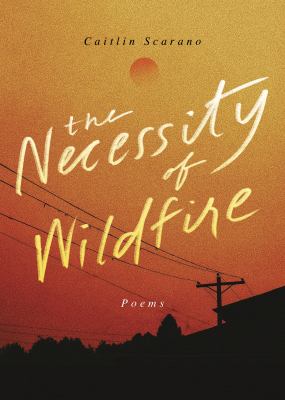The Necessity of Wildfire: Poems by Caitlin Scarano
Have you ever sat with a friend late into the night, listening as their stories turn from interesting memories to cries for help? It’s late and everyone else has gone home, leaving you alone with your friend as they tell you, “Back then I kept this great scream in my body.”
They tell you “There are people who start fires, not to tend them but to see how things burn,” and you realize the conversation has turned a corner and you are now obliged to hear them out all night, until the dawn arises.
That’s the impression I got from Bellingham poet Caitlin Scarano’s short book of poetry, The Necessity of Wildfire. Scarano, winner of the 2023 Pacific Northwest Booksellers Association Award for poetry, takes us on a harrowing journey of wide-eyed wonder at the stark realities of death and life and abuse and intimacy. The first poem, “The houses where they eat the lambs,” immediately hints at the depth of this conversation with unexpected turns of phrase and allusion: “but we are not the bird. Nor the feather / nor the stone that brought her warm / body down.”
When the second poem, “Every disaster branches out from another” described the protagonist’s fear as “a throat full of bees,” I realized this was real and important. This book builds a detective story of sorts, and as you read the poems within, you begin pulling out themes, recognizing patterns, comparing versions of stories in order to find out what happened to this woman.
The poems are intense and powerful in their language and original thoughts. “My body cavernquiet as he kisses my hip.” Free verse with choice words and lines stacked delicately like a house of cards and the occasional prose poems which read like streams of consciousness. She tells us her dreams and recounts details of her Virginia childhood. “A history of hammers” she says, and we wonder what that could mean.
The author drops surprising metaphors. “…the way a cat opens her mouth / and says nothing.” Symbols are everywhere: rabbits, deer, wolves, wasp nests, hammers, snakeskins, shovels, water, fire, all stepping in, masking other, more sinister themes. We might be reading a private journal with memories and family secrets as we hear about the protagonist’s mother and grandfather, her dying father, her sisters and her lover(s). The thread that ties them all together is her memory. We hear some concrete stories, but the author admits “every memory is two-sided” and we end up wondering again. We want a happy ending for her but “healing, like everything / else was not what we expected.”
This book is dark and yet, the author still manages to drop in a small hint of redemption:
In the morning I see a spider by a drop / of water on the bathroom floor. / When I realized she’s drinking / from it, it’s enough to stop me / from killing her.
Take this book as a collection of poetry or look at it as a confessional or maybe a puzzle to solve. Let the phrasing and ideas wash over you and then read it a second time. Caitlin Scarano aims to move you.
Reviewed by Neil McKay, online experience coordinator for the Whatcom County Library System.

